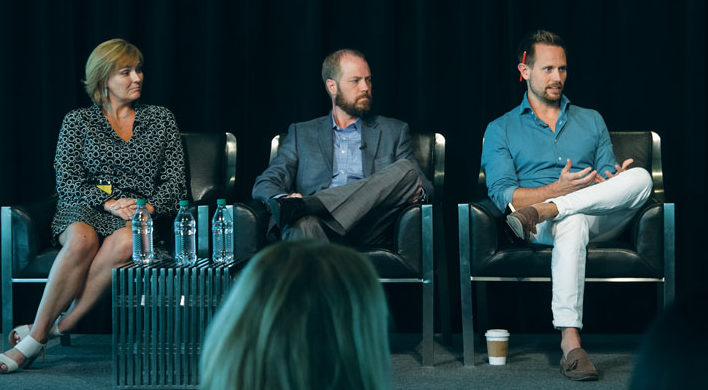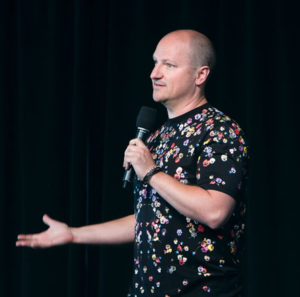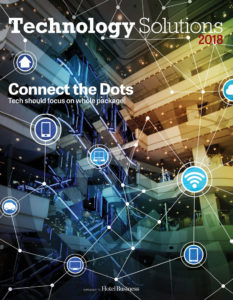WASHINGTON—No longer a siloed discipline, revenue strategy at hotels needs to be cohesive, strong and clear. At RSS 2018, held here at The Knight Conference Center in the Newseum, industry experts discussed how to make that happen and the industry disrupters that could affect hospitality.
“The disruption we’ve seen is, if anything, accelerating,” said Patrick Bosworth, CEO/co-founder, Duetto, one of the founding companies of the Revenue Strategy Summit. He added that when the conference was first convened six years ago, the conversation was almost exclusively about how online distribution was disrupting things.
“Obviously, Expedia and Booking.com were almost exclusively the topic of conversation in terms of the primary drivers of that disruption, as well as the collection of different brands that they control,” he said. “Now, I think the conversation has shifted. If you look at the NYU conference, you had the CEOs on stage talking very passionately about the ways that Facebook and Google, potentially Amazon, and other tech giants are also reshaping the industry.”
For his part, Brian Berry, SVP of sales and data analytics, Cvent, said whether these tech giants would have a negative or positive impact on the industry would depend on the circumstances. “As you look across different industries and think about the type of digital transformations that have taken place, they fall into different buckets. Not every digital company is the same,” he said, noting that some—Costco, Walmart and Macy’s—have managed to shift a significant amount of sales online. “Those are three of the top five in online sales last year. The fact that they’re brick-and-mortar companies shows it’s possible for existing companies to make that transformation.”
Other types of transformations include those like Amazon or Zappos, which created marketplaces for goods, and those like Uber, which introduced an entirely new business model that requires the technology to exist. “Think about Facebook, Apple, Alibaba—it really depends on which one of those swim lanes they choose to enter in terms of space,” he said. “Do they plan to completely disrupt it like Uber did to taxi drivers, or do they plan to create marketplaces that allow the market to operate more efficiently? It’s hard to tell. I don’t want to give a wishy-washy answer, but ‘it depends’ is probably the best answer you could come up with.”
Alexander Pyhan, VP, distribution – OTA, meta and wholesale, Marriott International Inc., noted that he has an issue with the word disrupter. “At the end of the day, a disrupter is really an innovator,” he said. “Uber addressed a consumer need before the consumer even knew they had that need. That’s why it’s successful. Obviously, at Marriott, we are concerned about these tech giants getting into the space, but we’ve also learned over the last few years to think about it differently. We have created a joint venture with Alibaba to leverage someone else’s ecosystem for our ecosystem in a market where we may not have the strength, the consumer base. There is room for innovation and also collaboration in a way that could be a win-win.”
Ash Kapur, SVP, hotel asset management & chief revenue officer, Starwood Capital Group, views tech giants as a positive. “It creates more optionalities for hotels from a distribution standpoint,” he said. “I can pick and choose whom I want to work with from an online distribution standpoint. It also gives me optionality if I’m a small hotel in a brilliant location that has a lot of demand, whether I need to incur certain brand costs: Should I be flagging it as a large brand or can I run solo and now have this option?”
He added, “On the flip side, it also creates competition, whether it’s for Booking.com or Airbnb, to find more players in this space. They will be more eager for our business.”
For his part, Berry pointed out that Amazon’s share when it sells a product is typically much higher than an OTA commission rate—a level much of the industry is already not in favor of.
Kapur noted that Amazon already has a staggering number of visitors. “They don’t have to sell inventory, they can allow travel to be searched on their website like Google Hotel Price Ads, which is where a lot of our business is coming from today, and there’s a cost of distribution out there. What is stopping Amazon from doing that?” he asked. “They can open up those eyeballs to yet another segment. Travel will become a vertical for this company. Why wouldn’t they monetize that space? For us, it’s important we deliver true loyalty—and loyalty is about knowing your guest.”
Pyhan agreed. “Loyalty is the way to create channel loyalty,” he said. “First comes brand loyalty, underpinned by powerful loyalty programs that provide reasons for consumers to be loyal. Loyalty members, regardless of status, book direct. That’s the way for the industry to create a system where you can drive them on from your own ecosystem versus someone putting down a tollbooth and every time a consumer walks by someone takes a cut of it. Loyalty is the linchpin in our distribution strategy.”
“What’s clear is everyone is competing to create value for the consumer,” Bosworth said. “There has to be a reason why a consumer should book through whatever channel that’s being offered to them: Things like choice, low prices, convenience would cause them to want to transact with that player.
“We’ve got new potential gatekeepers in the market,” he continued. “The cost of distribution will continue to be under pressure. But I also think there are reasons for optimism. It’s my belief that hoteliers have been so far behind on being able to create value, particularly on online channels, that they’ve focused on channels they still control, like the corporate contracted business, meetings and loyalty programs that still appeal to road-warrior business travelers. That’s been the bailiwick that has not seen significant erosion, whereas on the less frequent traveler, the more independent business traveler or the leisure guest, we’ve seen a lot of erosion in that. I think there’s actually an opportunity today where a lot of the intermediaries have gotten large enough to the point where now the game is being played on their turf, to some extent. As new big entrants come in, they’re competing for those same customers; it’s no longer a duopoly and hotels have the ability to leverage data and new technology, and to compete for those customers while also continuing to protect their own core.”
Noting all players are important to the ecosystem, Bosworth said, “No one would suggest that any of these big players would go away any time soon, nor should they, because they create tremendous value for the guest, but it’s my belief that hoteliers have an opportunity to be able to serve their guests better and create profitability for their own stakeholders.”
The key for hoteliers, said Andrew Rubinacci, president, AMR Hospitality Consulting, is for hoteliers to be willing to take the hit when it comes to making changes that will better position them in the long term. “It’s really hard to make these changes, and a lot of great companies and industries have tried to do this stuff before. The jury is still out on whether we’ll succeed in this industry to get equilibrium and really help with some of those acquisition costs,” he said. “We always look at the environment and say it’s going to be the same forever, but what ends up happening is people come in, take parts of the business, you’ve got competitors, and if you don’t do something differently, you decline. The trick is to go ahead and do something differently, but typically, if you do, there’s a gap. You drop revenues up front.That dip is the reason why businesses fail.”
“Hotel owners have always shown a willingness to invest in the technology and to take that dip,” Berry said, noting that the chart Rubinacci showed looked like every hotels’ RevPAR performance before and after a renovation.
“I don’t think it’s the owners,” Rubinacci said, indicating the misalignment of all parties is to blame, particularly those paid on top-line revenue. “We, as an industry, struggle because there are multiple components that are mostly aligned, but misaligned ways of compensation make it difficult to make those changes,” he said. “The fragmentation we have even within an individual asset just stops us from doing what’s right long-term.”
In terms of revenue, doing what’s right for the long-term also means having a visionary leader in charge. Kathleen Cullen, SVP, revenue & distribution, Two Roads Hospitality, noted revenue strategy has been evolving. “The discipline is moving toward involving planning and resource allocation to their strategic needs. Hotel revenue management has been a tactical and reactive discipline in the past, and we work very closely with sales and marketing, but they tend to focus very tactically on the transactional: What can we do to get more eyeballs?” she said. “That means there is not a lot of planning and resource allocation happening within the revenue -generation functions at hotels.
“What I mean when I say planning is understanding how much or what we should be targeting and how much we should be investing in order to achieve those targets,” she continued. “Most people assume this is already being done within revenue management or sales and marketing, but instead, what we’re doing is listing out a lot of the tactics and things we’re trying to execute without understanding the staffing or funding that’s needed in order to accomplish this. Many times, we’re saying what does sales need? Marketing? Revenue? Digital? We look at those in silos and we allocate resources in silos versus looking at a holistic approach.”
But, she said, given the high cost of customer acquisition for both the group and transient segments, and the need to spend marketing and payroll funds in alignment on the most promising targets, it’s time the industry becomes explicit and decides what to target ahead of time. “We need to evaluate the full range of opportunity and let that drive the team and the funding across all of the revenue disciplines,” she said. “This holistic view of revenue disciplines is different and it’s difficult to remove the walls that exist. Much of it is in the mindset. So much of the landscape has changed over the years, but hoteliers have not changed our approach and how we think about things. We need to embrace a holistic approach, looking at all revenue-generating disciplines. Most companies today still have sales as one, marketing as another, revenue as another or sometimes digital. Who is driving the overall process? Who is laying out the overall plans, directing the teams and deciding the allocation of funds?”
Gary Hawkins, VP of revenue strategy, Sydell Group, commented on the changing dynamic between revenue and sales. “I don’t think it was long ago that you’d see revenue reporting to a DoSM, which, as a revenue person, always seemed backward,” he said. “Not that it’s about territory or ego, but I view a sales team as another distribution channel. It’s been a fascinating shift in the relationship between sales and revenue.”
Andrew Jordan, chief marketing officer, Interstate Hotels & Resorts, noted, “Back when I was at Wyndham, the kinds of people who started in revenue management were more technical, highly analytical. Today, that’s the person who has got to be leading the conversation, and the conversation isn’t, ‘Should we open up the OTA and opaque channels?’ The question is, ‘What are we going to do to make more money as a hotel?”
Nolan Wrentmore, VP of revenue management and e-commerce, Aimbridge Hospitality, agreed. “You’re getting away from these tactical managers and you need somebody who can have that sales effort, that operation knowledge,” he said. “You need a well-rounded individual to ensure that they can communicate with asset managers, communicate the plan. We get into situations where we have to explain what happened yesterday—that’s the job. We have individuals who are good at explaining why, but what the asset managers and owners want to know is what are we doing about it? What are we strategizing and when is it going to turn around? Those are the individuals you need in your leadership team.”

Bonnie Amato, Fulcrum Hospitality; Nolan Wrentmore, Aimbridge Hospitality; and Gary Hawkins, Sydell Group
“The best leader should lead,” said Bonnie Amato, chief revenue officer, Fulcrum Hospitality. “Who is leading the singular process? It doesn’t make the second person any less important because one person can’t do it all. It’s frustrating that with all of this AI and data, that these systems are not self-fulfilling, so the manpower piece is challenging because you have to get someone who is good at the systems and at leadership. That’s not always a natural combination.”
She added that companies have to be committed to leadership training for that person. “If the right person has leadership capabilities but hasn’t been able to articulate them, get them trained,” she said.
So what type of person should hotels be looking for in a revenue leader in the digital age?
“You need the leadership, but you still need someone who can be analytical and dig through the data, and you need the salesmanship because you need someone to be able to communicate and sell the strategy,” Wrentmore said.
“Communication as the revenue leader is more important today than it was 15 years ago,” Jordan added.
Hawkins said, “You can’t forget the human element. Survey who else is on the team and make sure that person will fit in and be as effective as possible, given the dynamics of the team.”
And, the revenue leader shouldn’t be left in a silo. “When I grew up in marketing, I worked for The Coca-Cola Company, and the chief marketing officer always said marketing is way too important to be just left to the marketing people,” Jordan said. “When I think about revenue strategy, I think about it in that context. Revenue strategy is way too important to be left to the revenue strategists. Not only is revenue strategy about partnering with sales, marketing and e-commerce, it’s partnering with ops first and foremost.”
Wrentmore agreed. “For us, revenue strategy is not an individual effort, it’s a team effort. It’s about putting together a plan on what we all need to do to achieve a goal,” he said. “Everyone has to be involved and have that common component of understanding what our goal is and how we’re going to achieve it, and allow that plan to execute and not just jump ship after the first little wave.” HB



